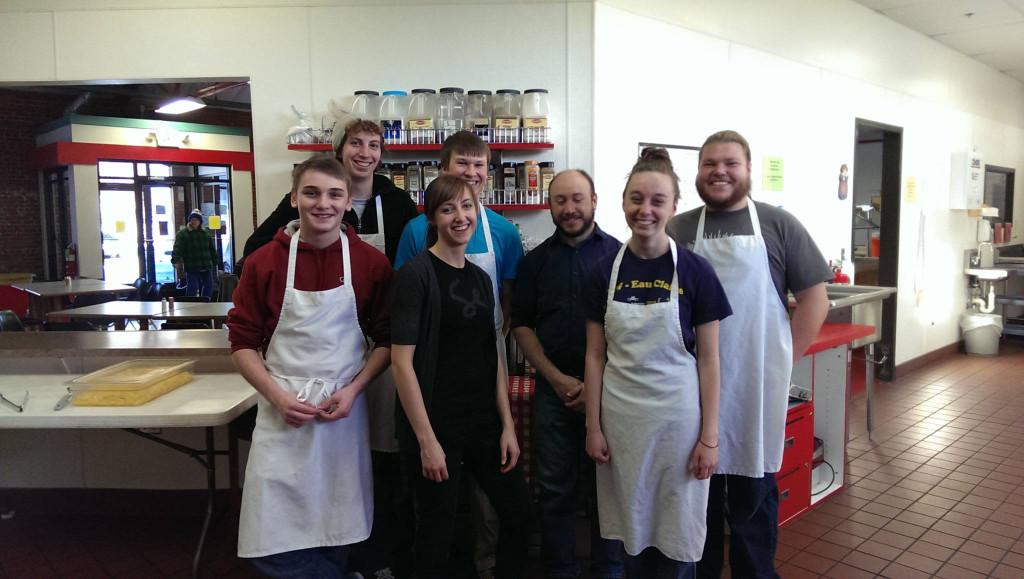Campus organization provides unique community
Fosters discussion and education
Photo by Submitted
Members of the Secular Student Alliance volunteering at the Community Table November 16.
November 20, 2014
One third of adults under 30 years old are unaffiliated with a religion, and the number is continuing to rise, according to a 2012 data from the Pew Research Center.
On UW-Eau Claire’s campus, the Secular Student Alliance is creating a community for the growing number atheists, agnostics and other non-religious students here in Eau Claire.
Ben Orlikowski, senior and president of SSA, said that the group provides a place for anyone to come and discuss current issues in open forum, regardless of their beliefs, and analyze topics in a rational way.
Orlikowski said that the group exposes people to views they may not have heard, and doing so humanizes people and creates more understanding.
“You probably know someone who believes in these things, or doesn’t believe in a god,” Orlikowski said. “And it’s important to remember that they are people too, and have morals.”
The group also advocates for secularism in government and the separation of church and state.
Orlikowski said that the group was created out of the UW-Eau Claire Free Thought Society in Fall 2013 and became a part of the SSA, which is a national organization on college campuses.
SSA started in 2000 at the University of Minnesota and is currently represented in almost every state and has 293 affiliate groups, according to the SSA website.
Its main goal, according to the site, is to “foster successful grassroots campus groups which provide a welcoming community for secular students to discuss their views and promote their secular values.”
SSA member Lisa Krawczyk said that despite the focus on secularism, the group is open to religious people and that their involvement gives a variety of stances to the weekly discussion meetings, which is what they want.
“There’s people from many different points of view, and that’s what makes it so nice,” Krawczyk said. “That we can come together and discuss controversial issues, or just issues in general.”
Krawczyk said that in addition to bringing a different point of view and discussion to campus, the group also hosts events, speakers and does fundraisers and work for the community.
She said they have volunteered at the Community Table, a local meal program, twice this semester.
The SSA also hosts an “Ask An Atheist” table either in Davies Center or on the mall several times a month.
Physics professor Scott Whitfield, who is currently the faculty advisor for the group, said his involvement started around 10 years ago, when he went to the speaker Dan Barker, which the group brought back to the campus Nov. 6.
Whitfield said he became interested in it as a discussion group, and said the group provides a place for the growing number of non-religious students to gather and talk with others.
He said the most important contribution of the group to campus is its openness and educational opportunities for all students.
“It’s good that it offers, for students who are religious, a chance to see that people can still be very moral and happy, and have interesting ideas, not based on a religious directive,” Whitfield said. “It gives people a different perspective of how to look at things.”
He said that exposing people to other people’s views is one of the key points of the groups, both atheism to theism and vice versa.
Orlikowski, Whitfield and Krawczyk all spoke of how the group is different from other groups dealing with faith or religion in that it is open to everyone, and doesn’t require a particular viewpoint to participate in discussions or events.
Open meetings are Tuesdays at 4 p.m. in Centennial 1916.
Krawczyk said no matter what you think about things, participating in the group can be beneficial.
“It’s a very open environment for people of all beliefs,” Krawczyk said, “and it’s just fun to be around.”



